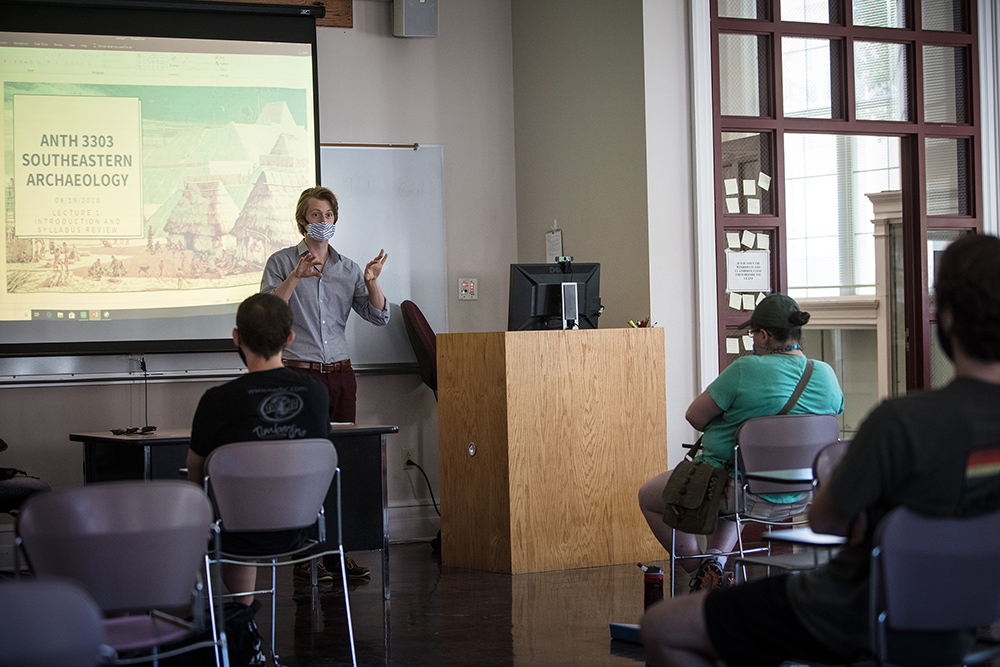
Katherine Smith was among the first students to greet the 111th session of Arkansas Tech University.
She sat in a corner at Baswell Techionery before 8 a.m. Wednesday, proudly wearing her Jerry the Bulldog T-shirt and contemplating the first day of a fall semester that will be far from routine due to the coronavirus (COVID-19) pandemic.
“It’s definitely not the norm,” said Smith. “It’s an added challenge. Before we could freely roam and talk with friends. You have to think about everything that you’re going to do. I’m excited to take on this task. I’ve waited for a long time to get here, and for me it’s been difficult. I’m focusing on going forward even with all this happening. Do the best you can with what you have.”
A product of Houston in Perry County, Smith believes the grit and determination that allowed her to make it this far will serve her well at ATU.
“I really feel that I have my own motivation to get up and go,” said Smith, who is majoring in criminal justice and criminology. “Not just in the morning, but the whole day.”
Compassion is another word that Smith is focusing on at the outset of the 2020-21 academic year.
“The faculty are learning about online learning just as much as we are as students,” said Smith. “We have to be patient with them. We have to consider what they are going through.”
As of the beginning of the fall 2020 semester, 28.5 percent of ATU classes on the Russellville campus are online, 24.7 percent are face-to-face and 46.7 percent are a hybrid delivery method — some online and some in-person.
Dr. Mike Bradley is one of the ATU faculty members adapting to that learning environment. An associate professor of recreation and park administration, Bradley is beginning his first year at Arkansas Tech.
“My emotions are mixed,” said Bradley as he sat in a lobby at Rothwell Hall and awaited his first class. “I’m excited to start a new semester. Everything is new, and I’m anxious to meet my students and more people across campus. It’s an interesting time as far as COVID-19. I’ve noticed that a lot of people are doing what they’ve been asked to do in terms of wearing masks and keeping a good distance. I’m encouraged by how everything is going. Even now, everybody is excited to be here.”
Samyia Williams, an ATU sophomore from Little Rock, is among those glad to be back on campus.
“Honestly, I thought we were going to be at home with no face-to-face,” said Williams. “It was exciting that we got to come back. I like seeing new people and all of the changes to make sure everyone is safe. I don’t want to catch the virus or take it back home to my family. The online classes will be tough. It was a struggle last spring, but I got through it. I learned a lot about how to work online classes and I’m glad I learned what to do and how to do it.”
The ATU pandemic recovery plan for academics was developed by its back to school transition committee, chaired by Dr. Richard Schoephoerster, and its academic contingency planning group, chaired by Dr. Jeff Aulgur.
Schoephoerster is dean of the ATU Graduate College and provides oversight for the university’s research initiatives, while Aulgur serves as interim associate vice president for academic affairs, interim dean of the ATU College of eTech and head of the ATU Department of Professional Studies.
“I think we’ve done everything within reason that we could do,” said Aulgur as he walked the campus on the first morning of fall 2020. “Like any other institution, it’s going to be a challenge. It’s going to come down to the compliance of our university family with what’s required to keep everyone safe. It’s good to have the students back. I know what it means to be part of the university community and having a daughter who is a junior at the university, I also have a personal investment in safety for students and our faculty colleagues.
“We look to this day every year,” continued Aulgur. “I have no doubt that with the work faculty, academic affairs and all the support teams across the university put in this summer, we’re committed to providing the best experience we can. As we work through it and become more experienced, it will be seamless. It’s just going to take some time to adjust.”






